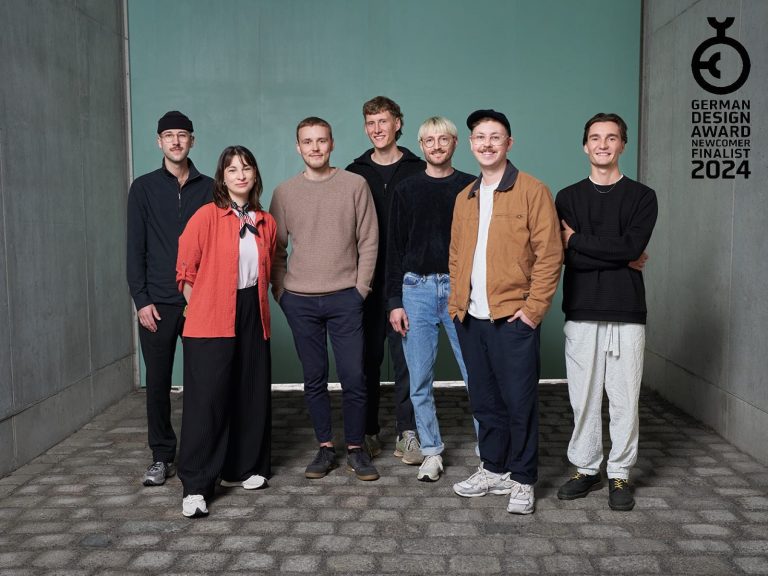The jury of the German Design Awards 2024 has selected the five finalists for the “Newcomer” award: Leonie Burkhardt, Justus Hilfenhaus, Nicolas König, studio formagora (Finn Blankenberg, Esra Heuermann, Nick Potter) and Sebastian Winter impressed the jury with their portfolios from the disciplines of textile design, product design, architecture, participatory design, and digital design.
With innovative solutions for current social and ecological issues and forward-looking ideas, projects, and products at a high level of design, they impressively demonstrate the crucial role that young design talents play in the successful transformation processes of our time.
The award demonstrates the importance of young design for the competitiveness and future viability of medium-sized companies. As drivers of further development, young designers with their future skills are decisive for their innovative expertise.
Collaborative work, interdisciplinary exchange, openness, a love of experimentation and a spirit of research are common features of the finalists’ portfolios. They all deal with opportunities for change, react to a faster-changing world, work conceptually and experimentally and dare to find playful solutions to complex challenges.
The jury of the German Design Awards 2024 was impressed by the wide range of content, diversity of perspectives and their respective implementation in practice. They can win the German Design Award, endowed with 15,000 euros and will be presented on 26 January 2024 in Frankfurt am Main.
The 5 finalists and their work:
Leonie Burkhardt (Textile Design)
Leonie Burkhardt was born in Heilbronn in 1994. After a two-year au pair stay in New Jersey, USA, she began a Bachelor’s degree in Textile Design at HAW Hamburg in 2016 and went to KMITL in Bangkok for an interim semester from 2018 to 2019. After completing her Bachelor’s degree in Hamburg, she moved to the Swedish School of Textiles in Borås for her Master’s degree in 2020, where she graduated in 2022. She was a scholarship holder of the German National Academic Foundation from 2019 to 2022. She gained practical experience through internships at Talbot Runhof and Kvadrat, among others. She has already shown her work in numerous international exhibitions such as the Dutch Design Week, the Milan Design Week and the International Biennal of Crafts and Creation in Paris. Leonie Burkhardt now works as a freelancer in the field of textile design. The core of her work is experimenting with textiles. Material and technology, innovation and craftsmanship are directly linked in her work: for example, she creates unusual projects and three-dimensional textile objects using both weaving and shrink yarn.
Justus Hilfenhaus (Product Design)
Justus Hilfenhaus was born in Offenbach in 1997. In 2016, he began studying product design at the Bauhaus University in Weimar, which he interrupted for a semester of industrial design at the Pratt Institute in New York. He also completed an internship at Studio Hanne Willmann in Berlin, where he continued to work as a designer after completing his bachelor’s degree in 2021. In 2022, he decided to study for a master’s degree in product design at the ECAL in Lausanne. Justus Hilfenhaus works in different product worlds as a matter of course: In the lights, electrical appliances or furniture he develops with great precision, the focus is always on designing products that offer exceptional and surprising added value.
Nicolas König (Architecture)
Nicolas König was born in Aachen in 1994. He studied architecture at the Berlin University of the Arts and the Royal Danish Academy in Copenhagen. In spring 2023, he completed his Master of Science with distinction as a DAAD scholarship holder at ETH Zurich under VOLUPTAS and Prof. Laurent Stalder. In addition to numerous engagements as a student assistant with Professors Christ & Gantenbein, Günther Vogt and Anne Holtrop, among others, he has already gained professional experience at OFFICE kgdvs in Brussels and at Muck Petzet and Felgendreher Olfs Köchling in Berlin. With his research-orientated work, Nicolas König pursues the goal of creating structures in the built environment that relate to and harmonise with the natural environment. His techno-ecological narratives move between physical fragments, experimental documentation and spatial investigations.
studio formagora (Product design / Participatory design)
studio formagora is a young studio for social design and transformative processes founded in Münster in 2022. studio formagora was founded by Finn Blankenberg (*1996 in Hamburg), Nick Potter (*1994 in Reinbeck) and Esra Heuermann (*1992 in Benkel). The three designers, who are also carpenters, met in their first semester at the Academy of Design of the Münster Chamber of Crafts and completed their studies in the same period from 2019 to 2022. studio formagora sees the design process as a tool and catalyst for change processes, whereby design is always understood politically by the three founders. Their thematic areas are socio-ecological change and participation. Encounters, furnishing public spaces and craftsmanship are core elements of their work.
Sebastian Winter (Communication Design / Digital Design)
Sebastian Winter was born in Stuttgart in 1996. Before he began studying media design at DHBW Ravensburg in 2017, he completed an apprenticeship as a graphic designer at the Johannes-Gutenberg vocational college in Stuttgart. In 2016, Winter began working as a trainee developer at Strichpunkt Design in Stuttgart, which accompanied him as a partner from the start of his dual study programme until his graduation in 2020. In 2020, Winter focussed on interaction design at Strichpunkt Design. He has been working as a freelance Interaction Designer & Creative Developer since December 2022. Since 2021, he has also been teaching interface design and creative coding in seminars and workshops at the HBK Essen, and currently also at the DHBW Ravensburg and the Bauhaus University Weimar on interface design. Sebastian Winter’s work aims to make complex content as accessible as possible, especially in the fields of education and science. The designer uses creative coding to promote interaction and open up a dialogue.
Further information under: www.german-design-award.com/en/the-newcomer.html


